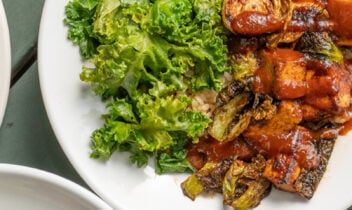
Insider’s Viewpoint: Diet & Mood: Can Food Put You In A Good Mood?
Can your diet really help put you in a good mood? And can what you choose to eat or drink encourage bad moods or mild depression?
While certain diets or foods may not ease depression (or put you instantly in a better mood), they may help as part of an overall treatment plan. There’s more and more research indicating that, in some ways, diet may influence mood. We don’t have the whole story yet, but there are some interesting clues.
Basically the science of food’s effect on mood is based on this: dietary changes can bring about changes in our brain structure (chemically and physiologically), which can lead to altered behavior.
3 Ways to Start A Better Eating Pattern
- Don’t Cut Out Carbs … Choose Smarter. The connection between carbohydrates and mood is all about tryptophan, a nonessential amino acid. As more tryptophan enters the brain, more serotonin (a neurotransmitter) is synthesized in the brain and mood tends to improve. Serotonin, known as a mood regulator, is made naturally in the brain from tryptophan with some help from the B vitamins. You may be able to boost these “feel good” brain chemicals by making smart carbohydrate choices like whole grains (oats vs donuts or popcorn vs cookies), fruits, vegetables and legumes – all of which also contribute important nutrients and fiber.
- Get More Omega-3 Fatty Acids. In recent years, researchers have reported omega-3 polyunsaturated fatty acids (found in fatty fish, flaxseed, and walnuts) may help protect against depression. This makes physiological sense, as omega-3s appear to affect neurotransmitter pathways in the brain.
- Go Mediterranean! The Mediterranean diet is a balanced, healthy eating pattern that includes plenty of fruits, nuts, vegetables, cereals, legumes, and fish — all of which are important sources of nutrients linked to preventing depression. Researchers wonder whether poor nutrient intake may lead to depression, or whether depression leads people to eat a poor diet. Folate is found in Mediterranean diet staples such as legumes, nuts, fruits, and particularly dark green leafy vegetables. Vitamin B-12 can be found in all lean and low-fat animal products, such as fish and low-fat dairy products.
Recipes
A Savory Veggie Sundae
Serves: 1Ingredients
- 1 cup of baby spinach, divided into two
- ¼ cup deli-style chickpea salad (chickpeas, cranberries, carrot and roasted red pepper in olive oil vinaigrette)
- ¼ ripe avocado, diced
- 1-2 tbsp hummus, balsamic caramelized onion (my favorite)
Directions
- Layer spinach on bottom of a sundae dish, followed by 2 Tbsp of chickpea salad, avocado and repeat.
- Top with dollop of hummus.
Banana Waldorf Dessert
This is a delicious, creamy dessert that leaves you completely satisfied at the end of the meal.
Serves: 6Ingredients
- 3 medium bananas, peeled and sliced
- 2 large apples, cored, peeled, and sliced
- 3 cups vanilla yogurt, low-fat
- ⅛ tsp cinnamon, ground
- 3 Tbsp. walnuts, ground
Directions
- Mix all ingredients together in a large mixing bowl.
- Place in individual serving dishes and chill until ready to serve.
Nutritional Information
Amount Per Serving: Calories 180; Total Fat 1.5 g; Sodium 100 mg; Potassium 550 mg;
Total Carbohydrate 27 g: Dietary Fiber 3.5 g, Protein 7 gSource: Recipe courtesy of Guiding Stars at guidingstars.com


